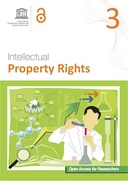Explore

Open Access for Researchers 3: Intellectual Property Rights
4 Ungluers have
Faved this Work
Login to Fave
This module has three units, and while the Unit 1 covers the basics of IPR, Unit 2 expands in detail the components of copyright and explains the origins and conventions associated with it. Unit 3 discusses the emergence of liberal licensing of copyrighted work to share human creation in the commons. In the last unit, we discuss the Creative Commons approach to licensing of creative works within the structures of the copyright regime that permits the authors to exercise their rights to share in the way they intend to. Creative Commons provides six different types of licenses, of which the Creative Commons Attribution license is the most widely used in research journals part of the Open Access framework.
At the end of this module, you are expected to be able to:
The curricula for researchers entitled “Open Access for Researchers” addresses OA issues within the community of research scholars. The modules cover the subject areas of Scholarly Communications, Concepts of Openness and Open Access, Intellectual Property Rights and Research Evaluation Metrics. The first four modules have been developed to nurture researchers with an elaborate understanding of the genesis, objectives, processes, types and existing limitations of OA scholarly communication, which include insights into the issues related to IPR, the methods and limitations of the process of peer reviewing and the concepts and roles of E-journals, databases, ICTs, OSS and other OERs. The final and fifth Module entitled “Sharing your Work in Open Access” provides a step-wise guideline for researchers about the process and options available for publishing their research work.
These curricula were developed after undertaking two detailed capacity building need assessment studies of librarians and researchers on Open Access. A multi-stakeholder expert meeting was organized in New Delhi, where 23 experts participated to finalize the curriculum. Two online consultations were also held to substantiate the expert meeting, which helped UNESCO to outline the content for each of the curriculum and provided a framework to develop modules.
The curricula were developed with the help of Commonwealth Educational Media Centre for Asia (CEMCA), New Delhi of the Commonwealth of Learning (COL).
At the end of this module, you are expected to be able to:
- Understand intellectual property rights and related issues
- Explain copyright, authors’ rights, licensing and retention of rights; and
- Use the Creative Commons licensing system.
- Open Access for Researchers 1: Scholarly Communications
- Open Access for Researchers 2: Concepts of Openness and Open Access
- Open Access for Researchers 4: Research Evaluation Metrics
- Open Access for Researchers 5: Sharing your Work in Open Access
The curricula for researchers entitled “Open Access for Researchers” addresses OA issues within the community of research scholars. The modules cover the subject areas of Scholarly Communications, Concepts of Openness and Open Access, Intellectual Property Rights and Research Evaluation Metrics. The first four modules have been developed to nurture researchers with an elaborate understanding of the genesis, objectives, processes, types and existing limitations of OA scholarly communication, which include insights into the issues related to IPR, the methods and limitations of the process of peer reviewing and the concepts and roles of E-journals, databases, ICTs, OSS and other OERs. The final and fifth Module entitled “Sharing your Work in Open Access” provides a step-wise guideline for researchers about the process and options available for publishing their research work.
These curricula were developed after undertaking two detailed capacity building need assessment studies of librarians and researchers on Open Access. A multi-stakeholder expert meeting was organized in New Delhi, where 23 experts participated to finalize the curriculum. Two online consultations were also held to substantiate the expert meeting, which helped UNESCO to outline the content for each of the curriculum and provided a framework to develop modules.
The curricula were developed with the help of Commonwealth Educational Media Centre for Asia (CEMCA), New Delhi of the Commonwealth of Learning (COL).
Why read this book? Have your say.
You must be logged in to comment.
Rights Information
Are you the author or publisher of this work? If so, you can claim it as yours by registering as an Unglue.it rights holder.Downloads
This work has been downloaded 709 times via unglue.it ebook links.
- 709 - pdf (CC BY-SA) at Internet Archive.
Keywords
- Nonfiction
- Open access publishing
- Scholarly Communication
- Textbooks
Editions

